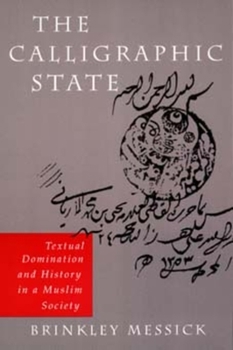The Calligraphic State: Textual Domination and History in a Muslim Society Volume 16
Select Format
Select Condition 
Book Overview
In this innovative combination of anthropology, history, and postmodern theory, Brinkley Messick examines the changing relation of writing and authority in a Muslim society from the late nineteenth century to the present. The creation and interpretation of texts, from sacred scriptures to administrative and legal contracts, are among the fundamental ways that authority is established and maintained in a complex state. Yet few scholars have explored this process and the ways in which it changes, especially outside the Western world. Messick brings together intensive ethnography and textual analysis from a wealth of material: Islamic jurisprudence, Yemeni histories, local documents. In exploring the structure and transformation of literacy, law, and statecraft in Yemen, he raises important issues that are of comparative significance for understanding political life in other Muslim and nonwestern states as well.
Format:Paperback
Language:English
ISBN:0520205154
ISBN13:9780520205154
Release Date:June 1996
Publisher:University of California Press
Length:324 Pages
Weight:1.19 lbs.
Dimensions:0.8" x 6.0" x 9.0"
Customer Reviews
1 rating
Ethnograpy of the Shari'ah
Published by Thriftbooks.com User , 22 years ago
Messick's work is perhaps one of the most interesting approaches to studying the shari'ah ever written. His focus and approach is that of an anthropologist, hence the ethnographic character of the book; however, at the same time he maintains a keen understanding of both history and fiqh throughout. The locus of this work is nearly entirely dominated by the highlands of Yemen and Ibb, the location of Messick's own ethnogrpahic study. Through the filter of Yemeni culture and the vast changes occuring there, Messick weaves a tale of what happenned theoretically, structurally, socially, politically, etc. to the practice of the Shari'ah within Yemeni society--oscillating between pre-modern, pre-bureacratic practices of the imamate, the effects of Ottoman reforms and the nationalist efforts at modernization. As is fitting in the context, a keen regard is kept throughout the work for the dialectial aspects of textuality and orality and how as the scales increasing tip in favor of textualized, bureacratic order Yemeni society is utterly transformed. We then are able to see how the shariah was reshaped from a central discourse of the Muslim polity into "Islamic Law" as yet another component of governance have been repositioned within the framework of the nation-state.





